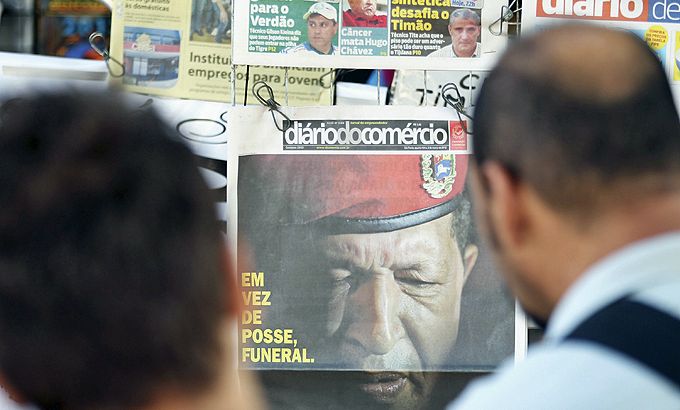
Death of a ‘dictator’: Chavez and the media
We examine why many Western media outlets continue to demonise the Venezuelan president after his death.
As Venezuelans mourn the death of President Hugo Chavez, there has been an understandable rush to deliver the final verdict on his record and legacy.
|
“He is not a dictator and it is ridiculous to call him one, what he is is a hybrid, he has autocratic tendencies or he had autocratic tendencies, but also he had genuine and very strong democratic electoral mandate and yet once in power he used that to concentrate powers in many many ways, and this is something that has been documented by Amnesty international and Human Rights Watch.” – Rory Carroll, a journalist and author |
As far as most mainstream western media outlets are concerned, the judgment is clear. His death marks the end of a revolution; he leaves behind a dangerously divided country and an economy in shambles.
But how accurate is this picture?
Even his detractors accept that over 14 years Hugo Chavez transformed Venezuela.
The slashing of poverty has cropped up in some coverage, and the increased access to education and healthcare.
Less so, the increased political participation of the electorate – 80 percent in the last election; or the steady economic growth rate – 5.8 percent for 2012.
Venezuela struggles with problems of infrastructure, crime, and inflation. And it is true that a section of the population is hoping that with Chavez’s passing, so too will the Bolivarian revolution.
That is reflected in the opposition’s 44 percent showing in the last election.
|
“It looks like the revolution will continue in Venezuela and in several other countries, where Chavez and also his inspiration played a very powerful role. The problem for the US press is that he violated all the economic rules and it was never about elections, they have the freest elections in the world, it was never about human rights. It’s about economics.” – Steve Rendall, a senior analyst with Fairness and Accuracy in Reporting |
But does such a strong showing in an election process deemed the best in the world by Jimmy Carter back up the assessment of the chairman of the US House Committee on Foreign Affairs, that Chavez was a dictator and tyrant who forced the people of Venezuela to live in fear?
It would seem that much of the Western media thinks it does.
So what lies beneath the Western media coverage of Chavez’s death?
Joining Inside Story Americas, with presenter Shihab Rattansi, are guests: Charles Hardy,who has lived in Caracas for 28 years working with the country’s poorest residents as a Catholic priest; Rory Carroll, the author of Comandante: Hugo Chavez’s Venezuela, and a correspondent with The Guardian newspaper; Steve Rendall, a senior analyst with Fairness and Accuracy in Reporting; and Alex Main, a senior associate at the centre for economic and policy research and a former consultant to the Venezuelan government.
| “I have lived most of the past 28 years in Venezuela, nobody talks about what life was like in Venezuela before the coming of Hugo Chavez, and I think it is extremely important for people to realise. I lived in a cardboard shack, a government housing project, it was a privilege because of the people I met, but it was horrible, no running water, no sewers and we would use newspapers that was our toilet …. that was the reality before Hugo Chavez, the people that lived in those shacks today they have decent homes, they have cars, their kids are studying in schools and they are working on degrees.”
– Charles Hardy, the author of Cowboy in Caracas |